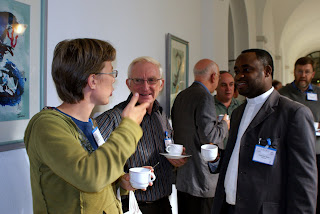Michaelmas Ordination in Padova - The Revd Sampson Ajuka

On 4 October the Revd Sampson Ajuka was ordained to the priesthood by Bishop Geoffrey Rowell. Fr Sampson is assistant curate of St Anthony of Egypt, Padova, which is within the chaplaincy of St George's Venice. The congregation of St Anthony of Egypt was started by Fr Sampson some 5 years ago and has grown in numbers and in extent of ministry. There is now a flourishing Mothers' Union branch and two Readers, Michael Udeagbara and Charles Onwukwe, were recently admitted and licensed, having completed their three years of study. Funds raised by Fr Sampson on the occasion of his ordination have been donated to construct a well for his home village in Nigeria. Under the supervision of the Archdeacon of Italy and Malta, Fr Sampson also provides pastoral care to other communities of Nigerian Anglicans in Italy. There is more information about St Anthony of Egypt, Padova here .











